IIM-A Grads Help Farmers Increase Income by 40%, With Personalised, Real-Time Inputs
Gramophone, an agri-tech startup co-founded by IIM-A graduates, has catered to over 8.5 lakh farmers, received over 1 million calls on their toll-free number and their multilingual app has been installed 2 lakh times.
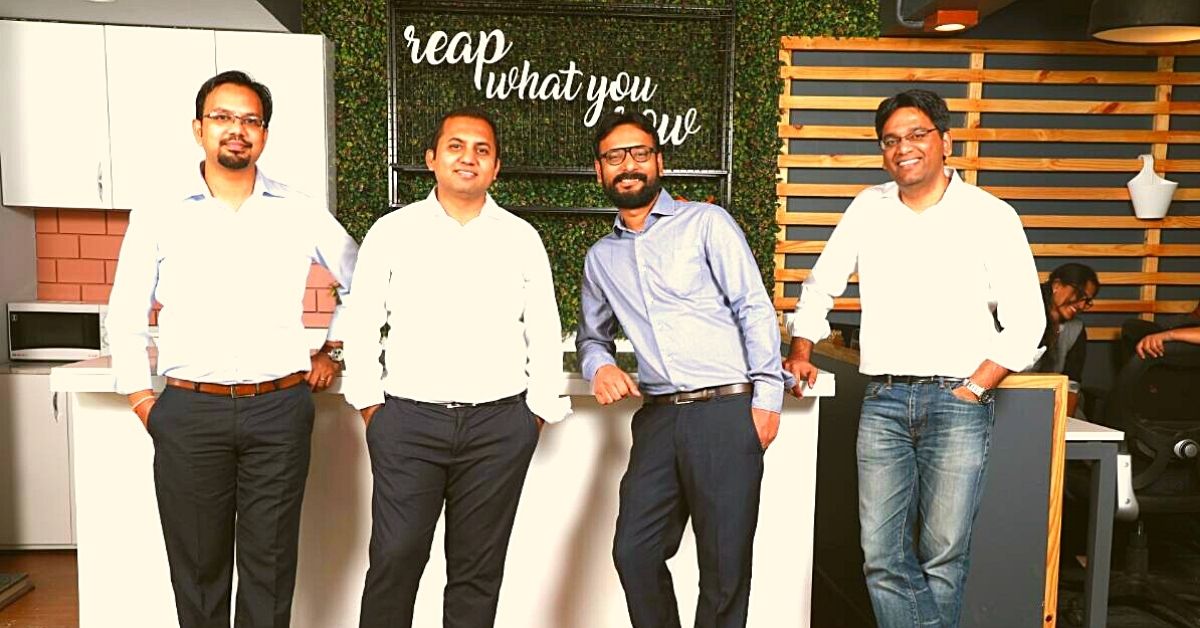
With a user base of more than 8.5 lakh farmers, Gramophone, an Indore-based agri-tech startup, has begun the process of monetising its unique farm advisory service.
(Image above of co-founders (L-R) Ashish Rajan Singh, Tauseef Khan, Harshit Gupta, Nishant Mahatre.)
In the past few months, small and medium farmers, largely from Madhya Pradesh, are paying Rs 500-Rs 1,500 (per season per crop) for what the startup calls — “premium agronomy intelligence”. As a result, they’re increasing their yields by 40 per cent more than the standard. Since they launched this premium service in April 2021, more than 3,000 farmers have subscribed to it. Out of its 8.5 lakh farmer-user base, and more than 1 lakh are also buying farm inputs from them.
Explaining the kind of inputs provided, Gramophone co-founder Tauseef Khan tells The Better India, “As part of our advisory service, we collect soil samples from farms through our on-ground partners and test them. Based on that testing, we build an entire profile of what sort of fertilizer or nutrition a farmer needs to apply on his farm. We offer personalised nutrition schedules for farmers based on these soil tests and are working with research institutes to develop more personalised nutrition recommendations for farmers, besides information on weather conditions, some government schemes and mandi prices.”
He adds, “It’s very important to maintain the health of the soil. In the event of a lack of microbial activity in the soil, the absorption of various nutrients is not very fast. No matter how much fertilizer you apply, the crop will not be able to absorb it. So, we introduce farm inputs to farmers, which can help address this concern and reduce their requirement of fertilizers and overall expenses.”
They have converted this system into a product and have given farmers recommendations based on pests and diseases that are likely to emerge across the cropping season.
“As soon as we punch in all the necessary farm-level data, an automated recommendation engine that we developed guides the farmer through the right notifications and IVR calls and SMSes suggesting what needs to be done on the ground. Farmers can either reach out to us on the app or call us on our toll-free number. We have onboarded agricultural scientists to assist farmers with queries. We provide all these through a data-driven, full-stack technology platform that makes farming intelligent on our simple Gramophone Krishi Mitra app (available in English and Hindi), enabling farmers to earn more,” he explains.
The startup has also added certain other services like an ‘Amazon Prime’ for agricultural inputs like pesticides, fertilisers, seeds and other products for soil nutrition. They also conduct online classes, where farmers get to sit down with an agricultural scientist every fortnight.
In the past two years, the startup claims that its Krishi Mitra app has mapped 2.5 million acres of agricultural land out of 160 million hectares of arable land. Their investors have pumped Rs 25 crores into the company since December 2020.
So far, the startup has received more than a million calls and have seen more than 2,00,000 app installs. They have delivered agricultural inputs to farmers in more than 20,000 MP villages and are planning to expand to other states like Uttar Pradesh, Maharashtra, and Rajasthan. Farmers are connected on the Gramophone multilingual app across the country.
“Gramophone is like my personal crop doctor and my experience with them has been quite fruitful. I have been associated with Gramophone for the last two years and used their agronomy services and purchased agri-inputs regularly. I also keep a track of the weather via their app and follow all modern techniques suggested by the experts,” says Shubham Chauhan, a farmer from a village in Khargone district.
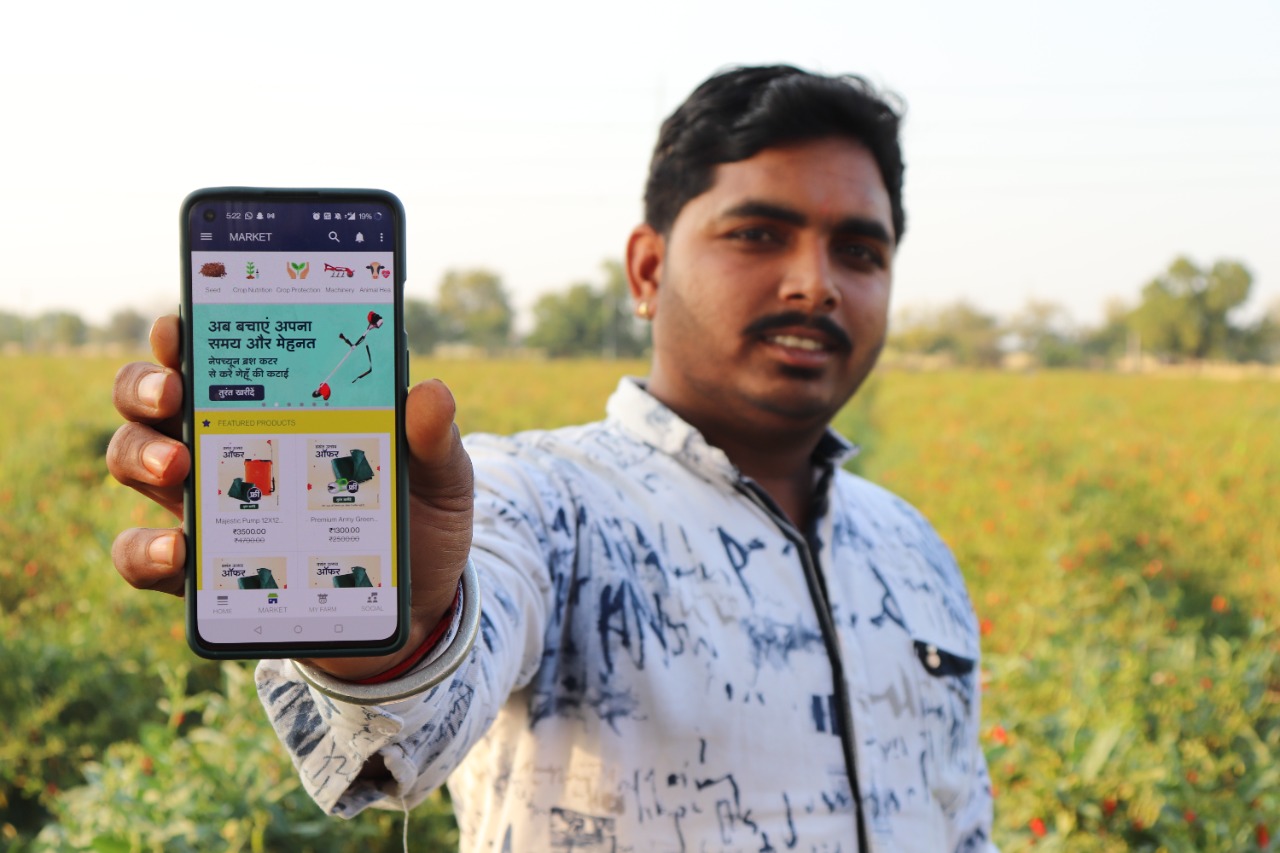
What The ‘Crop Doctors’ Ordered
Tauseef Khan and Nishant Mahatre, agricultural engineers from IIT-Kharagpur, met fellow co-founder Harshit Gupta at IIM-Ahmedabad during their agri-business management programme between 2012 and 2014. All three are natives of Uttar Pradesh and their respective families have also been primarily engaged in the business of agriculture.
It was sometime around 2015 when all three began thinking about entering the farm sector, leveraging their skill-set and knowledge, and establishing a startup that would come up with solutions for farmers to help raise their earnings.
“It was very clear that if we wanted to positively impact the lives of farmers, we needed to be very close to that ecosystem and build strong relationships. We just couldn’t build a software product and expect that it will do miracles. While launching this startup, the first thing we did was relocate to Indore, Madhya Pradesh. None of us are from the state, but we chose Indore for business reasons and primarily because we wanted to be closer to farmers than sitting in bigger cities and developing products there,” says Tauseef.
Establishing trust with farmers is a critical factor in building relationships with them. By 2016, the co-founders began travelling a lot to surrounding villages near Indore within a 70 km radius. They would go early in the morning on their bikes in rural areas outside Indore.
A lot of these relationship-building exercises, Tauseef recalls, were over 10 to 15 half cups of very sweet tea each day. “Farming is a community and relationship driven business in India. At the time, we didn’t have an app or a shiny product to throw at them. We would sit and talk to them about what new-age agriculture technology or methodologies can do for them. We prepared small presentations and pamphlets, describing the latest developments in agriculture. We would call these meetings with assistance from local youth we would hire, who knew the geography and maintained connections with local communities. The first phase of our startup involved a lot of trust and relationship building. The first customer we got on our platform was a relation of someone we hired,” he says.
A bootstrapped venture in the early days with limited capital, Gramophone spent the first six months gauging whether there was any value in what they were building. They worked with farmers for one farming season, sometime around June 2016, when the soybean sowing season in Madhya Pradesh starts. They had devised a toll-free number, on which a farmer could simply give a missed call. Mind you, this was a time when smartphone penetration wasn’t very high in rural Madhya Pradesh. Most farmers they worked with had some kind of a basic feature phone.
“We would go to a village at 5 am with those pamphlets at certain aggregation points in villages like a milk collection centre, distribute them and talk to farmers,” recalls Tauseef. “We were asked why we had left our jobs in big cities and come here to improve the lives of farmers. Besides these critics, there were the early adopters of our advisories. We gave them diagnoses of their respective crop problems, created pest and nutrition protocols for every crop, and those protocols were laid out on Excel sheets. On our toll-free number, farmers would call centre executives, whom we had hired. These executives were agriculture science students, who knew the subject or were sons and daughters of farmers. They could communicate, empathise and guide farmers in the right way. This protocol creation accelerated the process so that we didn’t have to train every individual. Like doctors, we began giving them the right diagnosis and started suggesting medicines [farm inputs] for them.”
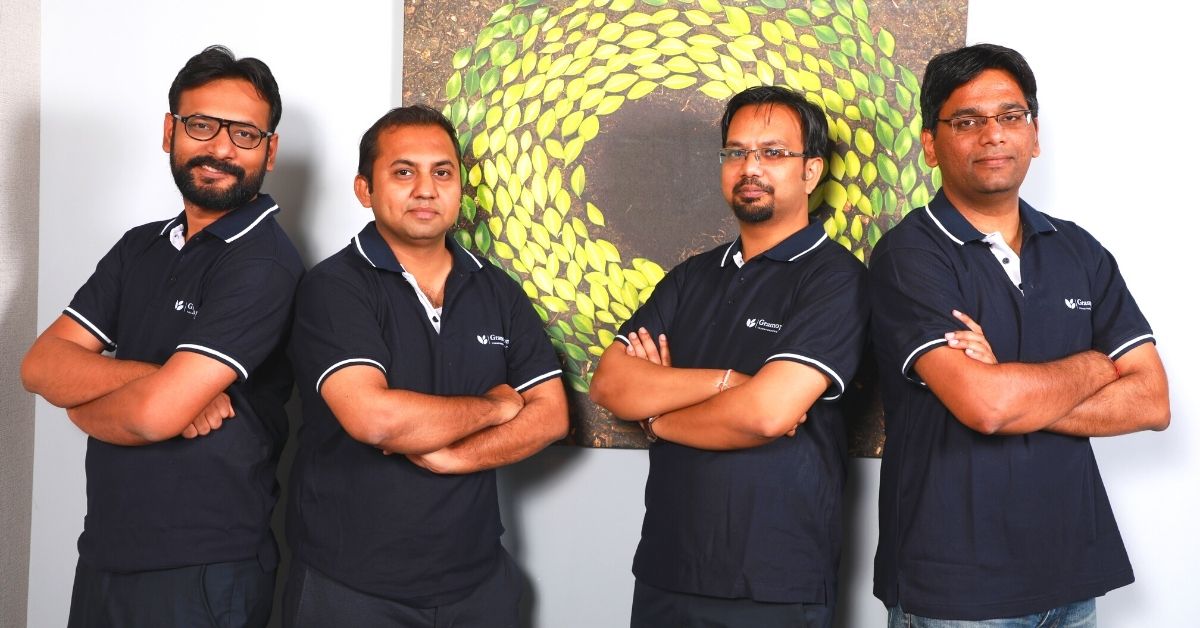
‘Personalising’ Agriculture
However, some farm inputs they were suggesting to farmers weren’t available in their villages. The quality of the advice they were giving wasn’t creating the necessary impact because of implementation concerns. That’s when Tauseef decided to become a medical store as well. “We needed to deliver these products [farm inputs] to our farmers, creating an end-to-end solution. We built that segment as well, following which we went into the delivery segment. In urban areas, you have Dunzo and Swiggy for food and groceries but in rural areas, we don’t have these logistics. So, we built a system where if a farmer asks for a certain farm input today, we can get it for him the next day. In the first six months, there were just four of us running the show,” he adds.
Towards the end of their first year, the startup raised its first round of investment. Money started coming in by November 2016, and by May 2017, they raised about $ 100,000 (Rs 65 lakhs). Besides hiring more people on the ground, Gramophone began propagating their toll free number faster to more farmers. From just four people, the startup now had 20 new employees in the first year and began covering a larger area and more farmers in the district.
By the end of 2017, they had gone from 500 to 5,000 farmers.
“By the end of that year, we launched our first online advisory application and began marketing it with the people on the ground since there were still very few folks there who had a smartphone. We carried on with this format till the middle of 2018. By then, smartphone penetration had grown faster and 4G internet was more available in rural areas. We launched a second version of the app, where we got into personalisation at the farmer’s level. Earlier, we were giving out general information, but now we wanted to build our app in a way that if a farmer is growing soybean in a given village, our app should give him or her personalised notifications, SMSes or IVRs describing what the situation of their crop is, say 30 days after sowing. Following this, the app would present probabilities about the potential problems it could face, and after that, we would recommend what type of fertilizer they could use. Essentially, we built into the app an additional farm management system,” he explains.
What this system does is personalise solutions for the farmer. Suppose, they are growing three crops, the app will suggest different farm input solutions for each crop, given the local weather condition, soil type, and guide them through every aspect of growing.
“Our backend technology driving these solutions can correctly predict up to 80 per cent accuracy. At different stages of the crop, there are different pest and disease problems. We were able to guide farmers on their personalised crops. At the end of the day, our guidance led farmers into buying different farm inputs on our platform. We have scaled this app up and built in various solutions and that’s how we’ve been able to get to about 7 lakh farmers on our platform now. Only about 45 per cent of the farmers on our platform use our app, while many still use our toll-free number,” claims Tauseef.
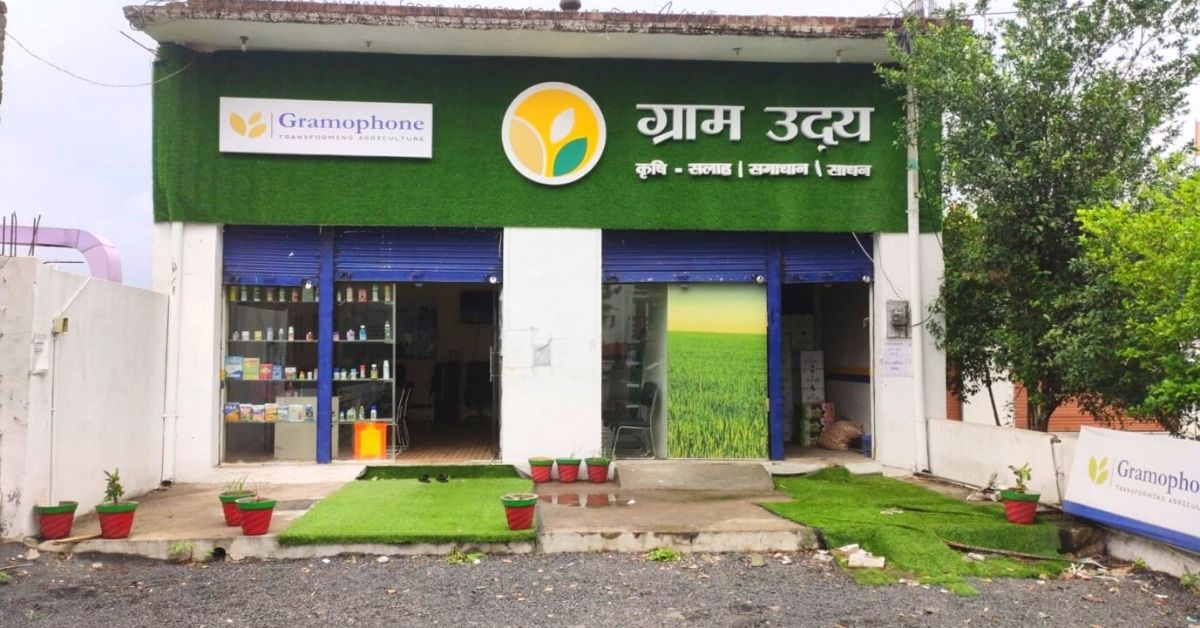
Within the app, these solutions are broken down into features like Gram Salah (for personalised farm management), Gram Uday (retail market for farm inputs) and Gram Vyapar, which enables post-harvest market linkages by bringing onboard traders, etc.
“On our toll-free number, we ask farmers basic information about the kind of crop they’re growing, sowing date and total area. Based on such basic metrics, we build a customised solution on the web application based on the data punched in by the call centre executive. With our backend technology, we automatically build in the farmer’s entire crop life-cycle. Since the farmer has a basic feature phone, the same information for which we send online notifications on the app, we are now sending him the same information through SMS or IVR. This personalisation is even for farmers with a basic feature phone,” he says.
“I have been using Gramophone services for my cotton crop production. Their cotton kit has been very helpful in cotton production this year. Home delivery services and timely suggestions of agronomy experts are a real help for farmers like us,” says Mohan Barfa, a cotton farmer from Barwani district, Madhya Pradesh.
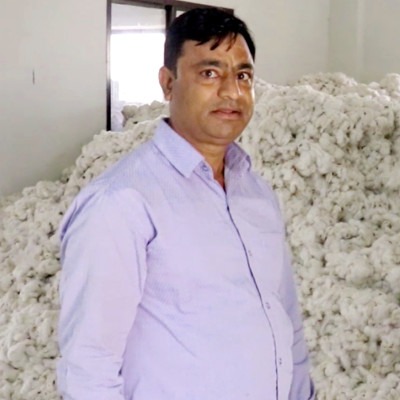
Gramophone has also created an online community on their platform where farmers can post their queries publicly and get other farmers to respond. Farmers associated with the platform are posting their success story. Posting success stories on the app has helped the startup get more referrals. Meanwhile, they have built another app called GramKonnect.
“This app allows rural folk to become entrepreneurs. A village entrepreneur can register a farmer on the app, punch in details about his crops, sowing area, and the app helps guide the farmer in an assisted way. To enable last mile deliveries, we built in a feature of order management, whereby the entrepreneur would get orders from farmers, collect the cash, submit that to the bank and deliver the given product. We call these partners village representatives, who are using the GramKonnect app. They are our physical touchpoint for the last mile and do the job of onboarding farmers,” he says.
With their multiple services, it’s safe to say that Gramophone offers farmers solutions that they never had the luxury of obtaining earlier.
(Edited by Yoshita Rao)
Like this story? Or have something to share? Write to us: [email protected], or connect with us on Facebook and Twitter.
If you found our stories insightful, informative, or even just enjoyable, we invite you to consider making a voluntary payment to support the work we do at The Better India. Your contribution helps us continue producing quality content that educates, inspires, and drives positive change.
Choose one of the payment options below for your contribution-
By paying for the stories you value, you directly contribute to sustaining our efforts focused on making a difference in the world. Together, let’s ensure that impactful stories continue to be told and shared, enriching lives and communities alike.
Thank you for your support. Here are some frequently asked questions you might find helpful to know why you are contributing?


This story made me
-
97
-
121
-
89
-
167











